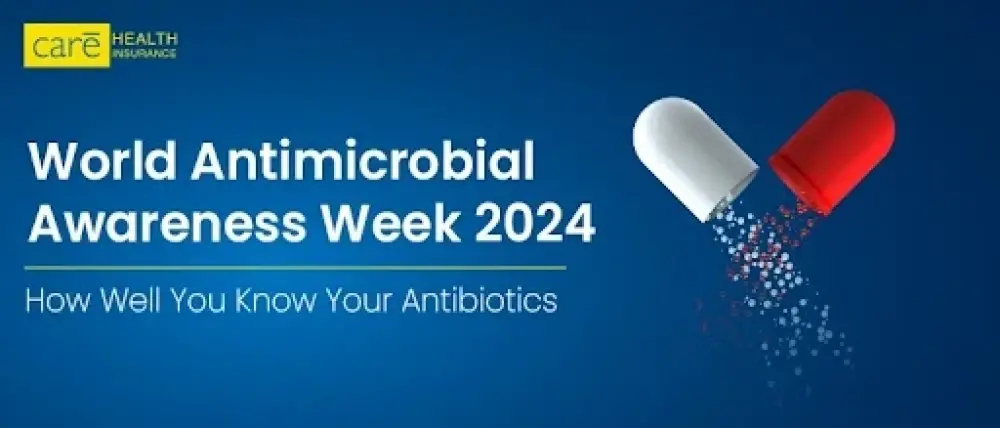Subscribe to get weekly insights
Always stay up to date with our newest articles sent direct to your inbox
Published on 18 Nov, 2022
Updated on 11 Apr, 2025
1204 Views
3 min Read

Written by Rashmi Rai
favorite0Like
favoriteBe the First to Like
World Antimicrobial Awareness Week (WAAW) is a global event that highlights the critical issue of antimicrobial resistance (AMR). It also encourages best practices in the prevention and control of infections. The World Antimicrobial Awareness Week or Antibiotic Awareness Week is celebrated between 18-24 November every year.
Let’s learn more about Antibiotic Awareness Week, its objectives, and how individuals and communities can contribute to combating antimicrobial resistance in detail.
Every year, during antimicrobial awareness week, the WHO urges authorities to spread awareness of the threats of antimicrobial resistance and educate people about the appropriate use of antibiotics.
This year, World Antimicrobial Awareness Week's theme is "Educate, Advocate, Act Now." This theme encourages collaboration across various sectors to educate people about the misuse of antibiotics. It also enlightens people to preserve the effectiveness of medicines that help save lives.
Antibiotics are therapeutic drugs that suppress the effect or kill other microorganisms, such as bacteria and fungi. Antibiotics are substances secreted by biological organisms and are used to kill another inferior organism. For instance, the penicillin used to treat osteomyelitis was first secreted by Penicillium fungus. Further, penicillin was genetically improved to enhance its effects and treat specific problems. Some familiar names of antibiotics that can be easily heard in Indian households are Amoxicillin, Azithromycin, Metronidazole, etc.
Once we take antibiotics frequently to reduce the effects or kill a specific pathogen inside our body, the pathogen starts fighting with the antibiotic and gradually develops resistance against it. This resistance of the pathogen against the drug is known as antimicrobial resistance. The case of antimicrobial resistance has increased over the years due to the overuse of antibiotics.
The World Health Organisation (WHO) annually urges people worldwide to celebrate Antibiotic Awareness Week with an appropriate slogan. This year, the motto is "Preventing antimicrobial resistance together."
To raise awareness, many activities and campaigns are held during World Antibiotic Awareness Week.
>> Also Read: How to Lead a Healthy Lifestyle?
Antibiotics are crucial parts of medicine. They are drugs used to kill foreign pathogens inside the body. However, the misuse of antibiotics has adverse effects on an individual's physiology. Thus, one must always take antibiotics with an expert's prescription.
Another reason people take antibiotics and other medicines on their own is the lack of resources to reach a doctor in times of need. Hence, to cover yourself financially for any such condition, you can rely on your best companion—a health insurance plan. We at Care Health Insurance provide unlimited e-consultations to enhance the doctor's connectivity with the patient.
This Antimicrobial Awareness Day, let us come together and protect ourselves and our loved ones from the threat of antimicrobial resistance!
Disclaimer: The above-mentioned information is for reference purposes only. Kindly refer to the official sources for the latest updates on the facts and information provided. Plan features and claims underwriting are subject to policy terms and conditions.
favoriteBe the First to Like
शुगर कंट्रोल कैसे करे? जानें, डायबिटीज में क्या खाना चाहिए Care Health Insurance in Health & Wellness
Thyroid : मामूली नहीं हैं महिलाओं में थायराइड होना, जानें इसके लक्षण और घरेलू उपचार Care Health Insurance in Diseases
हाई ब्लड प्रेशर को तुरंत कंट्रोल कैसे करें? देखें इसके उपाय Care Health Insurance in Diseases
प्लेटलेट्स की कमी के लक्षण, कारण और इलाज क्या है Care Health Insurance in Diseases
World Chagas Disease Day: Understanding Global Health Impact of Kissing Bugs Care Health Insurance in Awareness Days
World Parkinson’s Day: Raising Hope for the Elderly Care Health Insurance in Awareness Days
World Bipolar Day 2025: Understanding Bipolar Disorder and Breaking Stigma Care Health Insurance in Health Insurance Articles
ट्यूबरक्लोसिस (टीबी) के लक्षण, कारण और इलाज Care Health Insurance in Awareness Days